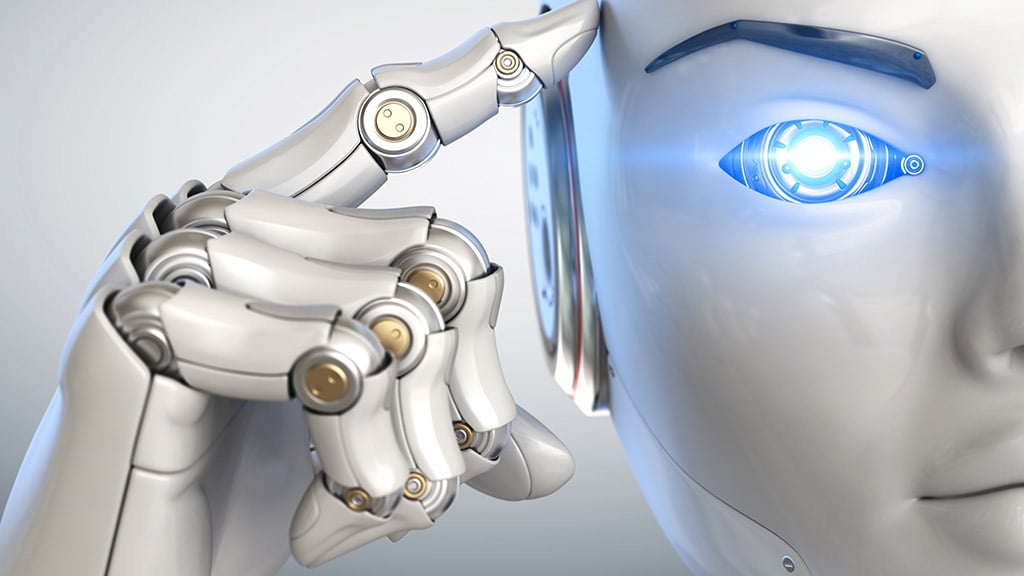Artificial intelligence – hype or sustainable trend?
You can easily understand how much the world has changed since the turn of the millennium, because you can hardly even imagine how you were able to live without Google, Amazon, Facebook and Smartphones, just 17 years ago. Almost everyone uses search engines, online trading and social media platforms every day. And almost everyone has these services permanently within reach on their Smartphone.
With these services, artificial intelligence (AI) has entered our everyday life in a big way. We have long since become accustomed to the highly complex, continuously learning algorithms in phrase searches, phrase additions and context-related suggestions. Our Smartphones effortlessly recognize people in photos and understand the words we speak. Texts are translated into any language, as if by magic. All these services are AI products now in everyday use, which at first astonished us as consumers, but which are increasingly becoming the norm and are now an integral part of our lives. AI is therefore clearly a sustainable trend.
But how do insurers use the same modern AI that Apple, Amazon, Facebook and Google have used to revolutionize the consumer market?
Artificial intelligence and insurers – a current overview
One thing you should know in advance: insurers have been using AI methods for a long time. For decades, OCR systems have been using optical character recognition to read addresses, barcodes, insurance numbers and other information from incoming mail. Expert systems support the classification of documents, the checking of insurance payments, and help with decisions for marketing campaigns. However, most of these systems are currently rule-based, i.e. they obey firmly configured rules. Self-learning systems that make decisions based on training data are not very widely used at this time. So, why is that?
Certainly, one of the reasons is that insurers attach great importance to the transparency of decisions in business processes. So, insurers have certain reservations about a "black box" learning machine, whose decisions cannot be understood by the person in charge and cannot be communicated to third parties. In addition, it is often difficult and costly to provide the high-quality and correctly classified data needed to train the learning machine so that it can generalize from examples and make "good" decisions in the future. Another problem is the lack of knowledge about how to select and properly configure suitable machine learning based procedures. Finally, there is the need for a thorough evaluation or comparison of the results of the learning machine. Often, there are not enough key figures available for this purpose.
However, these reservations seem to be melting away. Many insurers are currently using modern machine-learning-supported AI, fueled by the future Industry 4.0 project and the vast developments in this environment in recent years. People are increasingly aware of the potential that this new artificial intelligence has to offer. Success stories in the media, such as the fully automated motor vehicle expert [1], improved customer service through AI [2] or how machines are able to detect insurance fraud [3] are making people sit up and take notice. We can see the changes in the market and society, the massive innovative power, the many research groups, the start-ups that are developing self-learning systems and are producing a multitude of new ideas. An increasingly greater amount of digital and semantically annotated information is becoming available, which can be used intelligently to make automated and autonomous decisions. It also clear that the use of self-learning systems does not necessarily mean that the system has to be a "black box." They can also be used to optimize rule-based systems or to support them in the form of hybrid procedures.

A look into the future
Due to the great popularity of AI, it is already apparent that this rapid development will continue in the coming years. The interaction between algorithms, implementation and the use of special hardware is becoming increasingly sophisticated. AI systems will increasingly be capable of better identifying correlations. Just as Google Assistant, Siri, Alexa, Cortana, etc., will be able to recognize linguistic correlations more and more precisely, AI will increasingly be able to develop an understanding of insurance applications and claims.
The market is increasingly characterized by the possession and trade of artificial intelligence, which can be integrated into applications or processes as a service or as a plug-in, and can be used to perform complex tasks. It is becoming apparent that core competencies in insurance companies, such as customer service, benefit, claims and contract management are increasingly supported by AI and are being replaced by AI where it makes sense to do so. This is being done mainly for recurring, non-critical tasks. In the long term, insurance clerks will largely be responsible for handling tricky, critical cases and for quality assurance checks of the AI systems that work for them.
The use of AI also offers great potential for cost savings and thus for competitive advantages. Insurers are well advised to take advantage of these opportunities early on, and to expand their expertise in this field. After all, it is only through intensive involvement with modern AI that this potential can be tapped early on.
What kind of expertise is needed to set up these AI systems? Even though there are many adequate and comfortable frameworks available for machine learning, it is still not easy train a learning machine to deliver good results for a specific problem. There are many requirements which need to be implemented here: the selection or provision of a suitable amount of training, adequate preparation of the data, and possibly, the handling of incorrect training data, the extraction of the most suitable features, the selection and configuration of the learning algorithms, and last but not least, a suitable analysis and evaluation of the learning success. However, there are also signs of the increasing formation of patterns in learning processes, which suggests that the construction and use of AI systems will become simplified and standardized.
In conclusion
Artificial intelligence will massively change our everyday working lives in the coming years, especially in the area of self-learning systems. Insurers would do well to address this issue and to accumulate the relevant expertise. Especially since modern self-learning procedures offer great potential for the automation of almost all insurance processes and, because of the associated cost savings, they also offer significant competitive advantages.
Would you like to automate your claims management? Would you like to significantly reduce your claims processing costs and increase customer satisfaction? Our product Aisaac is an AI solution that can help you to do all of this!
Literature
[1] dpa newschannel. Der vollautomatische kfz-sachverständige.
[2] fw Verlag. Deutsche familienversicherung führt künstliche intelligenz ein.
[3] Wim Stoop (versicherungswirtschaft heute). Wie Maschinen Versicherungsbetrug aufdecken.

